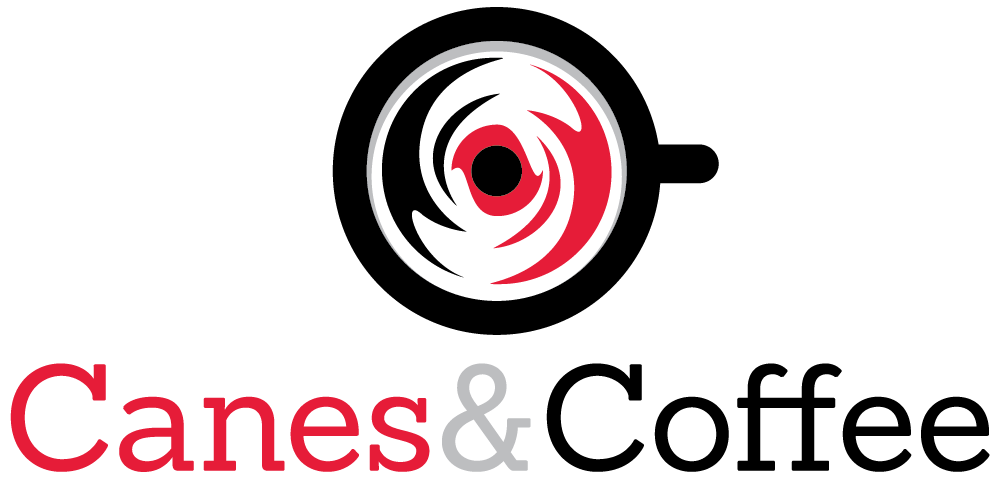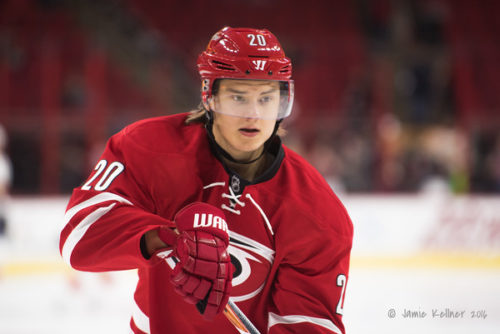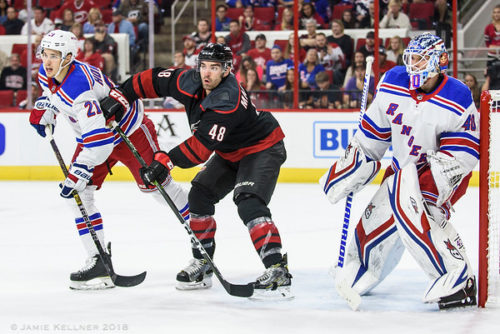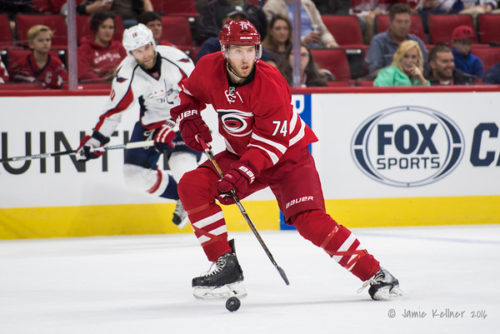Erik Cole’s Carolina Hurricanes career saw him arrive, play, depart, re-arrive, play and depart again. But whenever the ‘Cole Train’ was in Raleigh, hockey times were mostly good. He is one of only three players (Rod Brind’Amour and Niclas Wallin are the other two) who were part of the 2002, 2006 and 2009 playoff runs.
Cole was drafted out of Clarkson and after one year developing in the IHL, he burst onto the scene for the 2001-02 season. That season he vaulted to the top of the depth chart and won an NHL roster slot with his hard-skating, forechecking, powerful brand of hockey. My lasting image of him will always be the move where he had the puck toward the outside of the faceoff circle to the right of the net and then barreled at an angle straight toward the net. His ability to stay on his feet and keep the puck while seemingly at a 30-degree angle to the ice and usually with a defender draped over him hitching a ride astounds me to this day.
He finished the 2001-02 regular season with a very respectable 16 goals and 24 assists in 81 games. More significantly, he quickly established himself as a rugged, physical, difficult to play against power forward with speed to boot. He also settled in with similar big warrior-like line mates Rod Brind’Amour and Bates Battaglia. The trio’s lunch pail and hard hat style of play captured Hurricanes fans’ hearts and made their ‘BBC line’ nickname common terminology around Raleigh during playoffs in the spring and summer of 2002.
To this day, my favorite memories of Erik Cole were in the2002 Eastern Conference Finals versus Toronto. In that series, the regular matchup featured the BBC line trying to shutdown Toronto’s best line that had led the Maple Leafs three rounds deep in the playoffs. That matchup saw grizzled warrior, intimidator and occasionally completely nuts Gary Roberts (‘scary Gary’ as we was called) in the pressure cooker of the deep playoffs. He lined up at left wing which put him across from rookie power forward Erik Cole shift after shift. In that series, Erik Cole matched Roberts’ intensity, physical play and heart of a lion inside of the whistles. After the whistle time featured regular bouts of Gary Roberts in Cole’s face trying to intimidate him, goad him into a fight he did not want or gain any other kind of advantage he could against the rookie. Cole consistently faced up to Roberts, did not back down but also was not stupid enough to fight. Instead, he calmly went back to the bench unfazed to prepare for the next round of battle. Though he did not score in that series, Cole ultimately got the better of one of the greatest physical matchups in Hurricanes playoff history. The Canes won games four, five and six to claim a 4-2 series victory and advance to the Stanley Cup Finals. After collecting seven goals and ten assists in 13 playoff games entering that series, Roberts managed only two assists (no goals) in that six-game series.
In total in the 2002 playoffs, Erik Cole netted six goals and three assists in 23 games. His best series was against Montreal when he exploded for four goals and three assists in only six games. In game four of that series, he scored the game-tying goal with 41 seconds left to go in regulations to complete a stunning 3-goal comeback in the final period and set things up for Niclas Wallin’s overtime game-winner to finish the stunning win. The classic was immediately dubbed the ‘Miracle at Molson.’ Cole also scored the game-winner in the first game of those playoffs against New Jersey to help the Canes put the 2000-01 series loss behind them and start a new path toward victory in the rematch.
After coming within three wins of hockey’s greatest prize as a rookie, Erik Cole continued to develop despite the team’s woes the next couple seasons. By the start of the 2005-06 season following the lockout, Erik Cole had logged 214 regular season games and collected 48 goals and 61 assists.
But the best was yet to come. It was obvious right out of the gate in the 2005-06 season that the NHL game had changed and that it had changed in Erik Cole’s favor. The combination of Cole, another young and fast power forward in Eric Staal and a crafty veteran playmaker extraordinaire in Cory Stillman was lights out pretty much right out of the gate that season. Early on Stillman fed the two streaking power forwards to the tune of a scorching 50-goal pace and jumpstarted the Hurricanes in the process. By the halfway point of the season, the Hurricanes had established themselves as a surprising NHL frontrunner. Then it all ended suddenly. On a vicious hit from behind by Brooks Orpik on March 4, 2006, Erik Cole’s season was abruptly ended with a fractured vertebra in his neck. Despite playing only 60 games, he hit the 30-goal mark, one that he beat only in 2011-12 with 35 goals in a full 82-game season. He had also helped the team build confidence and a swagger unlike any previous Hurricanes team. The team rode that momentum all the way to the Stanley Cup playoffs.
During the playoffs, Cole started working out and then skating. Initially, it was thought that he was just working toward next season, but to the surprise of everyone Cole returned to the Hurricanes lineup for game six of the Stanley Cup Finals. Just the sight of him on the ice lifted his team mates and the fans. His role was limited in those playoffs, but I think he served to remind his team mates who were close to greatness but maybe a bit weary from the long grind, the level of sacrifice that had to be made to win the ultimate prize in hockey. He deservedly was in the lineup for the final two games and when the Canes hoisted the Stanley Cup in front of the home crowd at the RBC Center.
In the 2006-07 and 2007-08 seasons, Cole had solid seasons of 29 goals with 61 points and 22 goals with 51 points respectively. But the Hurricanes struggled both years, and before the start of the 2008-09 season he was traded to Edmonton for Joni Pitkanen. His departure was short-lived. When March arrived, Cole was struggling with his new team, and the Hurricanes were in a playoff race and looking for help at forward. Canes general manager pulled off a trade that brought Cole back to Raleigh. It was like he never left. His return sparked Eric Staal. Cole also kicked in offensively with 13 points in 17 games. And the Hurricanes returned to the playoffs. In the stunning run to the Eastern Conference Finals, Cole had zero goals and five assists.
Cole then played two more seasons in Raleigh before signing as a free agent with Montreal, then heading to Dallas and ultimately winding up in Detroit. On the all-time Hurricanes leader board, #26 ranks third in points, fourth in games played and fourth in goals scored. In parts of nine seasons, he played 557 games and collected 168 goals and 195 assists.
Though his career spanned five teams, Canes fans will always consider him one of ours for his role in all three playoff runs and because whenever he was around, times were good. For that, Erik Cole has earned a place amongst the all-time Hurricanes greats.
Go Canes!



